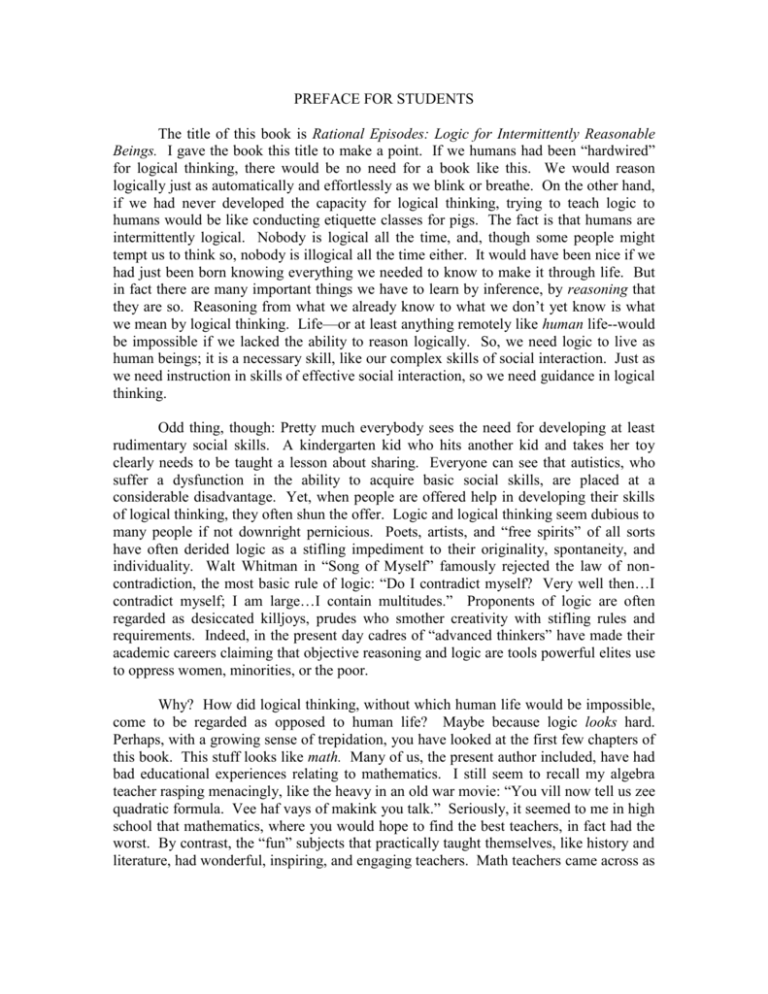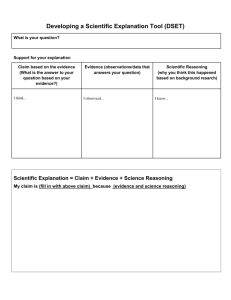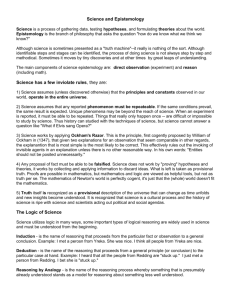PREFACE FOR STUDENTS
advertisement

PREFACE FOR STUDENTS The title of this book is Rational Episodes: Logic for Intermittently Reasonable Beings. I gave the book this title to make a point. If we humans had been “hardwired” for logical thinking, there would be no need for a book like this. We would reason logically just as automatically and effortlessly as we blink or breathe. On the other hand, if we had never developed the capacity for logical thinking, trying to teach logic to humans would be like conducting etiquette classes for pigs. The fact is that humans are intermittently logical. Nobody is logical all the time, and, though some people might tempt us to think so, nobody is illogical all the time either. It would have been nice if we had just been born knowing everything we needed to know to make it through life. But in fact there are many important things we have to learn by inference, by reasoning that they are so. Reasoning from what we already know to what we don’t yet know is what we mean by logical thinking. Life—or at least anything remotely like human life--would be impossible if we lacked the ability to reason logically. So, we need logic to live as human beings; it is a necessary skill, like our complex skills of social interaction. Just as we need instruction in skills of effective social interaction, so we need guidance in logical thinking. Odd thing, though: Pretty much everybody sees the need for developing at least rudimentary social skills. A kindergarten kid who hits another kid and takes her toy clearly needs to be taught a lesson about sharing. Everyone can see that autistics, who suffer a dysfunction in the ability to acquire basic social skills, are placed at a considerable disadvantage. Yet, when people are offered help in developing their skills of logical thinking, they often shun the offer. Logic and logical thinking seem dubious to many people if not downright pernicious. Poets, artists, and “free spirits” of all sorts have often derided logic as a stifling impediment to their originality, spontaneity, and individuality. Walt Whitman in “Song of Myself” famously rejected the law of noncontradiction, the most basic rule of logic: “Do I contradict myself? Very well then…I contradict myself; I am large…I contain multitudes.” Proponents of logic are often regarded as desiccated killjoys, prudes who smother creativity with stifling rules and requirements. Indeed, in the present day cadres of “advanced thinkers” have made their academic careers claiming that objective reasoning and logic are tools powerful elites use to oppress women, minorities, or the poor. Why? How did logical thinking, without which human life would be impossible, come to be regarded as opposed to human life? Maybe because logic looks hard. Perhaps, with a growing sense of trepidation, you have looked at the first few chapters of this book. This stuff looks like math. Many of us, the present author included, have had bad educational experiences relating to mathematics. I still seem to recall my algebra teacher rasping menacingly, like the heavy in an old war movie: “You vill now tell us zee quadratic formula. Vee haf vays of makink you talk.” Seriously, it seemed to me in high school that mathematics, where you would hope to find the best teachers, in fact had the worst. By contrast, the “fun” subjects that practically taught themselves, like history and literature, had wonderful, inspiring, and engaging teachers. Math teachers came across as harsh, rigid, authoritarian, condescending, and ruthlessly intolerant of anyone who did not instantly comprehend. We could do logic with no symbols or anything math-like at all. In fact, that is the way it used to be done. Logic for Medieval students was a non-mathematical liberal art and was learned mainly by rote memory and drill. The problem is that you cannot learn much logic that way, and the learning process is incredibly dull and tedious. In fact, using symbols makes studying logic easier and much more interesting. So, the first several chapters deal with symbolic logic. I think every educated person should be logically literate. That is, he or she should have a grasp of the basic terminology of logic, an understanding of some of the basic principles of good reasoning, and some first-hand experience with actually deriving conclusions from stated assumptions or premises. The most efficient way to gain such logical literacy is by studying symbolic logic. Though it employs symbols to create an artificial language, and has much stricter rules than ordinary language, symbolic logic grew out of our ordinary ways of speaking and reasoning. The basic argument forms I use in this book are forms of reasoning that have been recognized for centuries and which can be used to model many of the real-life arguments that people make. Also, I employ what are called “natural deduction” techniques when it comes to doing proofs; that is, the way we do proofs resembles to some extent the sort of thinking people spontaneously do when reasoning things out. Besides, if nothing else, symbolic logic is terrific mental exercise. Doing symbolic logic makes you think carefully and precisely. It is a mental workout, and like physical exercise, it requires effort, discipline, and exertion. But you will soon see that you are developing strong new mental muscles. As this book moves from earlier to later chapters, it moves from more abstract to more practical material. In the second section of the book we look at reasoning about probabilities and about the methods scientists use to hypotheses. Concerning probability, few things in life are certain, but, if you know how you can make good estimates about what is likely. The problem is that without training, and too often even with it, we have an almost perverse tendency to reason badly about probabilities. Yet, thinking rightly about probabilities is a vital skill and necessary in many disciplines and in daily life. Scientific reasoning isn’t just for scientists. Scientists employ rigorous methods and techniques to evaluate hypotheses—and they have been very successful in doing so. But scientific hypotheses are not the only kind; we have to deal with hypotheses all the time. For instance, the company you work for may be entertaining the hypothesis that the best way to recoup recent losses is to fire the most productive sales people (because they are making too much on commissions) and then offer them their jobs back at a reduced level of pay (this really happened, by the way). Is this the best way to control costs, or is firing your best workers a piece of mind-boggling idiocy? Hypothesis evaluation is important not just for scientists, but for businesspeople, historians, lawyers, doctors, and just ordinary folks. The final section of the book deals with informal reasoning and critical thinking. Thinking critically means listening more closely when people are trying to persuade you and evaluating their claims more carefully. It means being less gullible and learning not to have knee-jerk responses. Why is this important? Because there are many people out there—politicians, pundits, preachers, and, alas, professors—who have a vested interest in selling you an ideological bill of goods. They want you to believe what is in their interest for you to believe, and they have highly developed rhetorical skills to manipulate you. And these people are amateurs compared to the really expert manipulators, the advertisers. We live in what is called the “information age,” but it really should be called the “propaganda age.” Learning to protect yourself from predatory ideologues and superslick shills, like any marital art, takes study and practice. This book provides you with some of the weapons for intellectual self defense. So, why study logic? Because it is interesting and useful. Learning logic will not make you a less creative or interesting person. On the contrary, many of the most creative people are also some of the most logical. Consider Lewis Carroll, expert logician and author of Alice in Wonderland and Through the Looking-Glass. Neither will logic make you humorless or boring. Consider the late, great Kurt Vonnegut, Jr., who passed away just as this Preface was being written. His novels are full of fantasy and fun, but they also make you think hard about serious questions. Like his hero Mark Twain, Vonnegut used humor and imagination to blast hypocrisy, cruelty, stupidity, and fanaticism. When you mix logic and humor you get satire, perhaps the deadliest enemy of inflated nonsense and self-serving claptrap. So, don’t be afraid of logic. It takes some effort, but so does everything worth doing. Logic might not make you rich—ask any philosophy professor. Learning to think logically might also lead you away from comforting illusions, and so leave you sadder but wiser. But if you want to respect yourself, you have to know how to think for yourself, and this is where studying logic can help.









